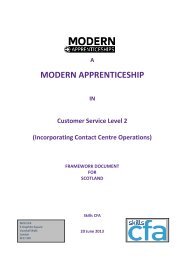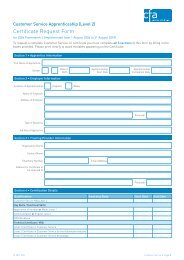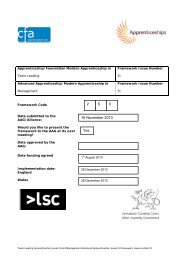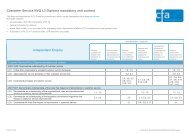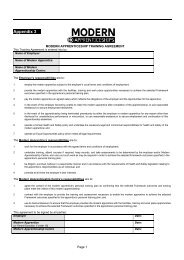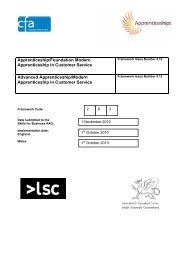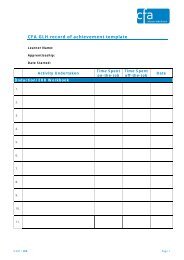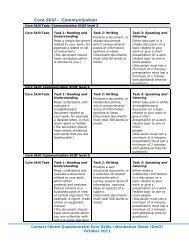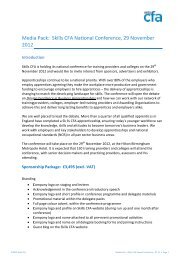(ERR) workbook - Skills CFA
(ERR) workbook - Skills CFA
(ERR) workbook - Skills CFA
Create successful ePaper yourself
Turn your PDF publications into a flip-book with our unique Google optimized e-Paper software.
Fixed-term and part-time employees<br />
The Fixed-term Employees (Prevention of Less Favourable Treatment) Regulations (2002) seek to<br />
guarantee that employees on fixed-term contracts are not treated less favourably than those who are<br />
employed on equivalent permanent contracts. This includes seasonal agricultural workers, retail<br />
assistants who work over the Christmas period, employees covering colleagues whilst they are on<br />
maternity leave or those employees who are employed to complete specific tasks, such as painting a<br />
house. These regulations give fixed-term workers the same rights to the terms and conditions of<br />
employment as those on permanent contracts.<br />
The Part-time Workers (Prevention of Less Favourable Treatment) Regulations (2000) seek to<br />
guarantee that part-time employees are not treated less favourably than equivalent full-timer<br />
workers. It states that part-time employees:<br />
<br />
<br />
<br />
<br />
<br />
<br />
are entitled to the same rate of pay as a full-time worker<br />
must be provided with the same training opportunities as full-time employees<br />
must be given the same holiday allowance as a full-timer, but at a pro-rata basis<br />
must be offered the same career break schemes as a full-time worker<br />
are entitled to the same contractual maternity and parental leave as full-time employees<br />
must not be treated less favourably during a redundancy process.<br />
Apprentice minimum wage<br />
Apprentices aged between16-18 or in the first year of their apprenticeship must be paid a minimum<br />
of £2.68 per hour. The salary of apprentices aged 19 and over (and not in the first year of their<br />
apprenticeship) must be equivalent to, or above, the national minimum wage for their age (for<br />
information on the National Minimum Wage, look here: https://www.gov.uk/national-minimumwage-rates).<br />
Grievances<br />
If you have a problem or a complaint about your employment in relation to things such as your terms<br />
of employment, work conditions, work relations, organisational changes or health and safety you<br />
have the right to be able to raise these concerns with your employer. This is known as raising a<br />
grievance.<br />
It is your responsibility to inform your employer as soon as possible about any grievance that you<br />
may have. In most instances, you should always first try to resolve the problem informally, before<br />
taking any further action. However if you do decide to take out a formal grievance, you should follow<br />
your employer’s formal grievance procedure.<br />
©2014 <strong>Skills</strong> <strong>CFA</strong> 6 | P a g e




